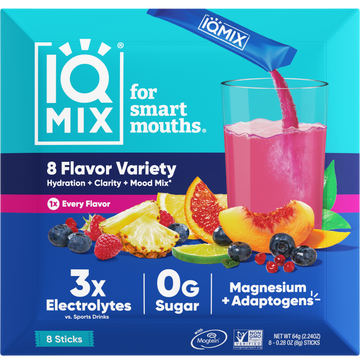Ever feel like your brain’s stuck on dial-up instead of blazing on broadband? Your thoughts become pixelated and fuzzy, your memory’s stuck in endless buffering, and your attention just keeps dropping.
Those are classic signs of brain fog — and dehydration may be the cause of your mental RAM maxing out. So let’s peek into your noggin’s hardware to understand the science behind this connection. Then, we’ll talk about how to upgrade your mental performance with proper hydration (hint: it’s more than chugging plain water).
Dehydration and Brain Fog: Two Saboteurs of Mental Clarity
Let’s begin our journey with dehydration. It happens when your daily water intake doesn’t balance the water you lose from sweating, peeing, breathing, etc. Losing water also means losing critical electrolytes your body and brain need to perform at their best.
Signs of dehydration include:
- Thirst
- Dry mouth, lips, and skin
- Less frequent urination (and dark urine when you do go)
- Dizziness and lightheadedness (especially when standing up)
- Muscle cramps and twitches
- Poor concentration and difficulty thinking
- Headaches
- Sluggishness and fatigue
Now, let’s talk about brain fog. Researchers say this cluster of symptoms affects your cognitive abilities.[*] The causes of brain fog include everything from stress and poor sleep to starting a low-carb or keto diet, certain medical conditions, taking certain medications, and more.
Signs of brain fog include:
- Confusion and a lack of mental clarity
- A short attention span and trouble focusing or concentrating
- Memory problems, forgetfulness, and losing your train of thought
- Taking longer to process information, respond to questions, or follow conversations
- Headaches
- Fatigue, sluggishness, and difficulty finishing tasks
Notice how some of the symptoms of dehydration and brain fog overlap? That’s more than a coincidence.
3 Effects of Dehydration On Your Brain
Your body is up to 65 percent water, but your brain is 75 percent water by mass.[*][*] So it’s your job to drink enough water to maintain these preferred volumes.[*] According to studies, dehydration can:
Decrease Blood Flow To Your Brain
Blood carries oxygen and nutrients to your hard-working noggin and neurons (brain and nerve cells). However, dehydration slows blood flow.[*] Less blood means less fuel to make more brain cells or keep your cranium powered up and firing on all cylinders (cue the brain fog).
It Can Also Adversely Impact Brain Structure
Imaging studies reveal that dehydration causes brain cells and tissues to shrink.[*] It also decreases brain tissue fluid, gray matter, white matter, and overall brain volume. Worse? Similar decreases were seen in cases of mild cognitive impairment or Alzheimer’s.[*][*]
Though these results were reversed with rehydration, dehydration may still negatively affect your cognitive function and brain’s overall health.[*][*][*]
Dehydration Affects Your Brain’s Electrolyte Balance
Electrolytes are essential minerals that carry an electric charge throughout the human body and brain. The primary ones include sodium, calcium, magnesium, potassium, and chloride. These help balance the amount of water in/out of your cells, maintain steady blood pressure, support muscle function, and more.[*]
Dehydration causes electrolyte imbalances, which disrupt your nervous system and brain function. Electrolytes are tied to energy levels, neuron communication, nerve signaling, cognitive function, moods, mental health, and more.[*] So when any of them become unbalanced, you open the door for brain fog to creep in.
That’s Why Science Shows Dehydration Steals Your Brilliance
Studies show that even mild dehydration (losing just 1.5–2% body water) impairs cognitive performance — especially for tasks involving attention, short-term memory, and concentration.[*][*][*] It also has the potential to:[*][*][*][*]
- Decrease motivation
- Make tasks feel more difficult
- Lower brain power and cognition
- Increase cortisol (the stress hormone) and tension/anxiety
- Trigger headaches
- Tank your energy levels
Unfortunately, scientists say that women appear to be more susceptible to the side effects of dehydration than men.[*]
But it doesn’t matter whether you just finished 30 minutes of physical activity or are sitting at your desk — the effects of dehydration are the same. This underlines the importance of staying hydrated at all times, not just during a workout or when you’re in the sun.
How To Prevent Dehydration and Avoid/Clear Out Brain Fog
Who wants to battle brain fog when you can avoid it altogether? There are two steps to keeping your mental processor running smoothly and your inner genius ready to tackle any challenge:
1. Aim for Proactive Hydration
Hydration is when your fluid intake matches or exceeds what you lose during the day. Drinking enough water is essential for everyone but especially crucial for high-risk groups, such as older adults, people with diabetes, and children.[*]
Use these hydration hacks to prevent the brain drain:
- Drink a full glass of water when you first wake up. Your body and brain perform a ton of work while you snooze — without access to water for those 7–9 hours. So replenish your water levels to get out of the red and into the black.
- Consider your needs. You’ll need more water if you’re in hot, humid, or dry climates, taking diuretics, getting a lot of sun exposure, on a low-carb or keto diet, or following hydration rules for athletes.
- Monitor the color of your urine. It should be a very pale yellow if you’re properly hydrated. Dark yellow or tan indicates greater dehydration and the need to up your H2O.[*]
- Don’t leave home without a reusable water bottle. Bonus points if you get one with a filter, so tap water tastes as crisp as mountain spring water.
Studies show that drinking water improves cognitive performance, decision-making, processing speed, working memory, attention, and mood.[*][*] However, hydration is about more than just water.[*]
2. Balance Your Electrolytes for Rehydration
Drinking plenty of water should be part of any wellness routine, as should balancing your electrolytes. When you chug too much water during the day, you run the risk of overhydration. This means your electrolytes get so watered down that they’re basically useless.
Rehydration ensures you sustain the right amount of water and electrolytes.[*] While you could get these minerals from dietary electrolyte sources, most people don't get enough from food alone. This goes double if you’re fasting.
So, drink to thirst with a hydration multiplier like IQMIX. You’ll soak up the perfect amount of water and work on your electrolyte goals simultaneously.
Each sugar-free IQMIX packet contains just 3 grams of carbs and the minerals you need to maintain electrolyte balance for energy and hydration:
- 500 mg of sodium (which doesn’t dehydrate you)
- 450 mg of potassium
- 750 mg of Magtein®, a clinically studied form of magnesium (magnesium L-threonate) that supports cognition and mood
Plus, each sleeve packs 250 mg of super-concentrated lion’s mane mushroom — an adaptogen that supports brain health, lowers stress levels, and elevates mental performance.[*]
⚖️ Balancing your electrolytes can fortify a well-watered mind against dehydration, fatigue, headaches, and brain fog. See for yourself with the IQMIX 8-Stick Sampler!
So, how do you fix brain fog from dehydration once it’s already set in?
3. Banish Brain Fog with Natural Caffeine from Coffee
Contrary to the popular myth, coffee doesn’t dehydrate you. Studies reveal that your daily brew may be just as hydrating as water.[*]
As a naturally occurring nootropic (cognitive enhancer), the caffeine in coffee offers benefits for your brain like:[*][*][*]
- Increased energy, alertness, and attention
- Enhanced focus and concentration
- Faster information processing
- Improved memory
- Better mental well-being
That makes caffeine for brain fog a slam dunk.
Packed with super concentrated Lion’s mane extract, our keto-friendly IQJOE instant adaptogenic coffee takes the edge off caffeine, so you capture long-lasting, crash-proof, jitter-free energy. It’ll help reduce stress, power up your productivity, and sharpen your thinking with each sip.
⚡Don’t Let Dehydration Throttle Your Brain Power
Staying hydrated and balancing your electrolytes gives your noggin the power to become a mental marvel. You’ll feel more alert and focused, spark more creative and innovative ideas, and decrease the odds of a headache sidelining your genius.
Ready to unlock the brilliance of a well-hydrated mind?
🧠 Your brain told us it wants the Ultimate Sampler — the easiest way to try every IQMIX and IQJOE flavor (plus every IQBAR!). We think your brain’s pretty smart.
Written by Lauren Ciccarelli, a writer and research geek passionate about low-carb nutrition, mental health, and meditation. Her 2,500+ articles empower doers with science-backed tips for leveled-up living.




